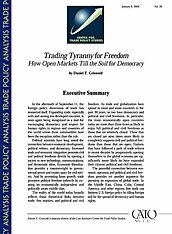In the aftermath of September 11, the foreign policy dimension of trade has reasserted itself. Expanding trade, especially with and among less developed countries, is once again being recognized as a tool for encouraging democracy and respect for human rights in regions and countries of the world where those commodities have been the exception rather than the rule.
Political scientists have long noted the connection between economic development, political reform, and democracy. Increased trade and economic integration promote civil and political freedoms directly by opening a society to new technology, communications, and democratic ideas. Economic liberalization provides a counterweight to governmental power and creates space for civil society. And by promoting faster growth, trade promotes political freedom indirectly by creating an economically independent and political aware middle class.
The reality of the world today broadly reflects those theoretical links between trade, free markets, and political and civil freedom. As trade and globalization have spread to more and more countries in the last 30 years, so too have democracy and political and civil freedoms. In particular, the most economically open countries today are more than three times as likely to enjoy full political and civil freedoms as those that are relatively closed. Those that are closed are nine times more likely to completely suppress civil and political freedoms as those that are open. Nations that have followed a path of trade reform in recent decades by progressively opening themselves to the global economy are significantly more likely to have expanded their citizens’ political and civil freedoms.
The powerful connection between economic openness and political and civil freedom provides yet another argument for pursuing an expansion of global trade. In the Middle East, China, Cuba, Central America, and other regions, free trade can buttress U.S. foreign policy by tilling foreign soil for the spread of democracy and human rights.

This work is licensed under a Creative Commons Attribution-NonCommercial-ShareAlike 4.0 International License.

